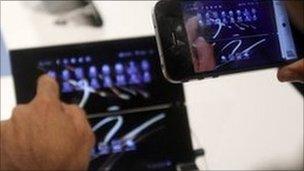'Stop fighting' MPs tell mobile operators
- Published

Demand for data is putting the squeeze on networks
A committee of UK MPs has criticised mobile operators for fighting over how to share out the airwaves that will deliver next-generation services.
The radio spectrum auction will provide more bandwidth for operators.
The Commons Culture, Media and Sport select committee urged operators to stop delaying the process.
The UK is currently on track to be one of the last European countries to hold its 4G auction. Regulator Ofcom hopes to hold the sale mid-2012.
O2 and Vodafone have threatened legal action if the auction goes ahead in its current form.
John Whittingdale MP, Chair of the Committee, said: "Ofcom has had a very difficult job adjudicating between competing and polarised interests, and we are concerned that constant disagreement and special pleading from the four mobile network operators appears to have further delayed the spectrum auction.
"We believe that the basic rules for the auction which Ofcom has laid down are sensible and fair, and that further delays will result in the UK falling further behind in this vital area. The auction needs to proceed as soon as possible," he added.
Spectrum gift
The sale of airwaves freed up by the switch-over to digital TV is seen as key to providing the much-needed bandwidth for data services following the exponential rise of smartphones.
The spectrum being auctioned is particularly valuable because it is low frequency and therefore covers greater distances.
It is also better at penetrating buildings, crucial as more consumers use their smartphones to surf the web at home.
Three has always claimed that it is at a disadvantage to the other three operators because it has no 2G spectrum. It also claims it is unfair that the other operators have been "gifted" 2G spectrum by the UK government.
It was further angered by a decision made by Ofcom in January to allow O2, Vodafone and Everything Everywhere to reuse their 2G spectrum for 3G services.
The select committee looked at that decision and concluded that it had not "permanently distorted the market in favour of those licence holders".
However it did voice concern that the proposed spectrum sale by Everything Everywhere may result in the company making a substantial profit from a public asset that was granted to it for free.
It said that the government and Ofcom should look into mechanisms to ensure that at least a significant proportion of the proceeds be used to benefit consumers.
Clashes
Ofcom has made clear that it wants Three to remain as a competitor in the UK mobile landscape because it has ensured that consumers get innovative services and low prices.
In its proposals for the spectrum auctions the watchdog set mechanisms to ensure that Three got a portion of the 4G spectrum at a minimum price.
This angered O2 and Vodafone who threatened legal action over the floors, claiming they amounted to state-aid for Three.
The committee said that in its view, Ofcom's proposals were the right ones.
Ofcom also proposed that one of the spectrum licences should have a condition of providing mobile internet coverage to least 95% of the population.
The Committee said that Ofcom should go further to hasten the rollout of broadband and set it at 98%.
It also argued that the regulator should consider applying this obligation to more than one licence.
Ofcom is holding a second consultation, due to end in December, to finalise how the auction should work.
During the course of this month all four mobile operators will meet with the regulator and government to find the best solution to the issue.
- Published3 November 2011
- Published7 October 2011
- Published27 September 2011
- Published26 July 2011